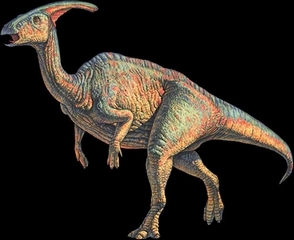Parasaurolophus walkeri - Cretaceous Dinosaurs
Homepage > Cretaceous Dinosaurs - Parasaurolophus walkeri
(pair-a-sor-oh-loaf-us)
"near Saurolophus"
Describer Parks, 1922
Also Known As --
Type of Species walkeri
Order Ornithischia
SubOrder
InfraOrder --
Micro-Order --
Family Hadrosauridae
SubFamily Lambeosaurinae
Size 30 feet ( 9.1 meters) long
Period Late Cretaceous, 76 million years ago
Fossilsite Utah, New Mexico, USA; Alberta, Canada
Diet Herbivore
Parasaurolophus lived during the Late Cretaceous Period, 76 million years ago in what is now Alberta, Canada; and parts of the US. This dinosaur belonged to the family of duck-bills. All duck-bills had a crest on top of their heads, some crests were hollow and others were solid. Paleontologists believe that with this solid crests, this dinosaurs may have been able to make a loud honking sound using their nasal sacs. They may have used this sounds to communicate with other members of the herd over long distances.
They may have also used these sounds to potentially attract a mate or to warn others of predators near by. On some of the adult males this crests could be as long as six feet. The difference in these crests may have helped members of the herd to identify males from females, juveniles from adults or two different closely related species. Parasaurolophus spent most of its time on all four legs, so it needed to have muscular shoulders. Oversized pelvic bones allowed Parasaurolophus to rear up on their hindlimbs to reach higher food and to run away from predators.
Parasaurolophus walkeri Paleo Gallery
Click on images to see more art from artist!
